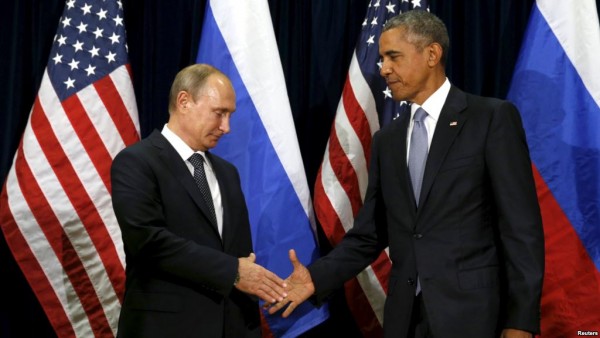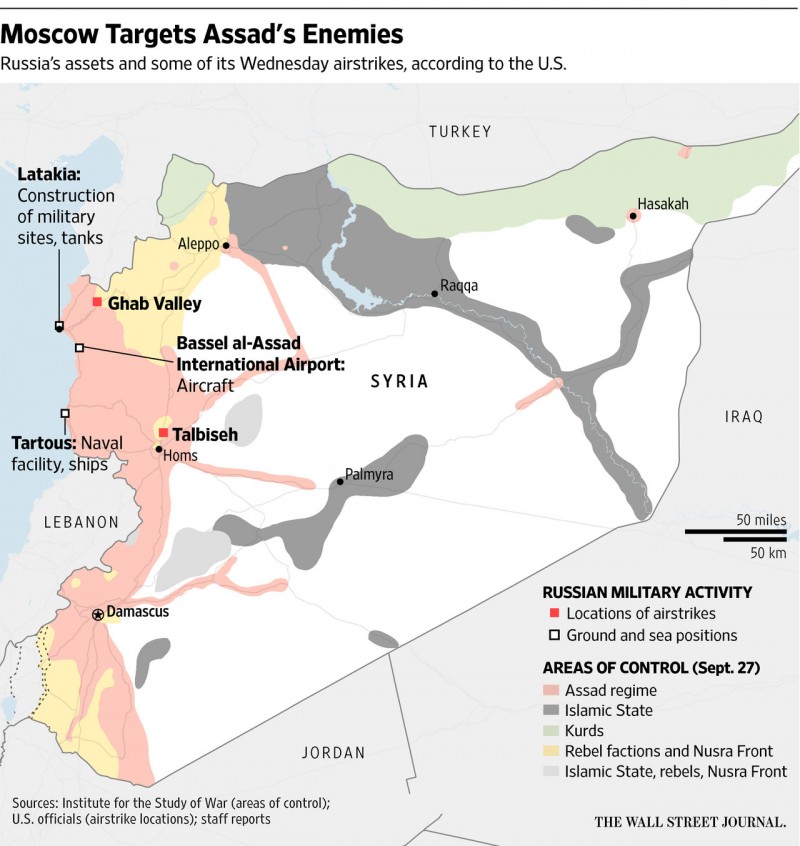 On Monday afternoon, President Barack Obama grudgingly sat down with Vladimir Putin in part to gain a clearer understanding of the Russian leader’s opaque plans for Syria.
On Monday afternoon, President Barack Obama grudgingly sat down with Vladimir Putin in part to gain a clearer understanding of the Russian leader’s opaque plans for Syria.
Less than 48 hours later, Putin unpleasantly surprised Obama with new clarity: airstrikes that are scrambling the U.S. president’s plans for Syria and escalating the global rivalry between Washington and Moscow.
The timing of the Russian airstrikes was more than a surprise — it seemed designed to insult the U.S. president and to demonstrate Putin’s swagger at a moment when world leaders are gathered at the United Nations, reassessing global security.
“That kind of political theater is important to him,” said Paul Salem, vice president for policy and research at the Middle East Institute. “Misbehaving is part of his global game.”
Late Tuesday night, hours before the strikes, Secretary of State John Kerry convened a meeting of several regional diplomats at New York’s Palace Hotel to discuss a collective strategy for Syria. The group failed to agree on a unified approach, but now Russia’s strikes are forcing a larger U.S. reassessment of the situation in Syria and how to approach it.
One former senior Obama official said he doesn’t see danger of a direct military clash between Russia and the U.S. But, he added,”obviously this is a huge political thorn in our side.”
Despite the private alarm, the administration’s initial response has involved a measure of Putin-like braggadocio. Obama officials suggested Wednesday that Putin was acting out of weakness because he fears the defeat of Moscow’s ally, SyrianPresident Bashar Assad, and the loss of Russia’s foothold in the Middle East. Defense Secretary Ashton Carter called Putin’s strategy “doomed to failure.” White House press secretary Josh Earnest said Putin could be wading into a quagmire akin to America’s 2003 invasion of Iraq or the ill-fated 1979 Soviet invasion of Afghanistan.
Given Obama’s unhappy experience in Syria thus far, where even his modest efforts to support rebel groups have brought him mostly political embarrassment, there is some underlying truth to such talk, analysts said. “I don’t think the White House is terribly upset that somebody else is getting mired in the Syrian civil war or the fight against ISIS,” Salem said.
But those speculative scenarios were small consolation on a day when U.S. officials appeared blindsided.
For weeks, Obama officials have been monitoring Moscow’s recent buildup of fighter-bombers and attack helicopters near the western Syrian city of Latakia. In recent days they came to expect some kind of Russian attacks to prop up the embattled Assad regime.
Still, the specific timing of the strikes was a surprise to them, despite Obama’s 90-minute session with Putin on Monday and several meetings this week between Kerry and Russian Foreign Minister Sergei Lavrov.
More disturbing was the nature of those strikes — particularly Russia’s decision to strike around the Syrian city of Homs. Fighters from the Islamic State, also known as ISIS or ISIL, are not believed to be massed there. Other radical Islamist fighters, including ones affiliated withAl Qaeda, are in the vicinity of Homs. But so are more moderate rebel fighters who have received covert aid from the U.S. and from Persian Gulfstates like Saudi Arabia.
Russia’s precise targets were unclear (although Moscow-based media outlets claimed that Russian strikes hit ISIS forces).Carter told reporters that Russia “may well have” hit non-ISIS fighters, and,speaking at the U.N., Kerry said the U.S. “would have grave concerns should Russia strike areas where ISIL and Al Qaeda -affiliated targets are not operating.”
Putin pays less attention to the distinctions between rebel groups than do American officials, who overwhelmingly focus on defeating ISIS. His prime goal seems to be ensuring the survival of Assad’s regime, which Putin told the U.N. on Monday is “valiantly fighting terrorism face-to-face.”
Obama takes a sharply different view of the conflict, which has claimed some 250,000 lives, created millions of refugees and inspired radical extremism worldwide. Obama insists that Assad’s vicious battle against rebel fighters is only fueling Syria’s civil war and giving sustenance to ISIS. Obama says the Syrian conflict canend only with a political solution that ushers Assad from power, perhaps after an extended transition period — an outcome Kerry has been pursuing in recent weeks.
“Russia’s not going to be successful in imposing a military solution inside of Syria,” Earnest told reporters, adding: “At root,this is a political problem.”
But despite optimism about U.S.-Iranian cooperation after the Iran nuclear deal, one person who recently spoke with several Iranian officials says there’s little sign that Assad’s chief patron, Iran, is willing to support such an outcome. And after sending signals this summer that he might be willing to end his support for Assad as part of a settlement, Putin now seems to be doubling down on the Syrian ophthalmologist -turned-dictator.
As the U.S. and its allies recalibrate their strategy for dealing with Assad, they are focusing for now on getting Moscow to pressure the Syrian leader to limit indiscriminate attacks on civilians.
“The international community will expect Russia to use the increased influence it has to stop the use of weapons like barrel bombs that have targeted and killed thousands of innocent civilians, and to prevent any use of chemicals as weapons by the regime,” British Foreign Secretary Philip Hammond said at the U.N., echoing similar remarks by Kerry.
“It’s very troubling if Assad is getting the impression that he can get a free pass from the Russians,” said the former administration official.
There was at least an attempt at public conciliation Wednesday evening, when Kerry and Lavrov appeared jointly in New York. The two diplomats said they had traded ideas about Syria’s political future, and that the U.S. and Russia would begin military-to-military talks to minimize the risk of an accidental clash between U.S. and Russian aircraft operating in the same war zone—the first time that has happened since the end of World War II.
But Russia’s recent track record leaves U.S. officials with little hope for a quick resolution to an increasingly complex crisis.


Leave a Reply
You must be logged in to post a comment.